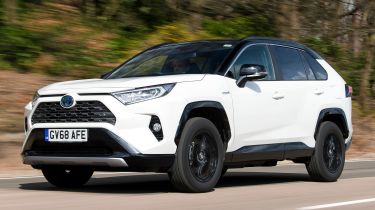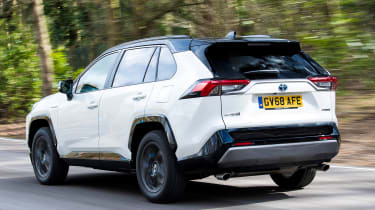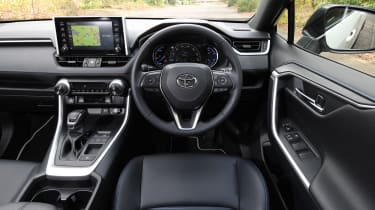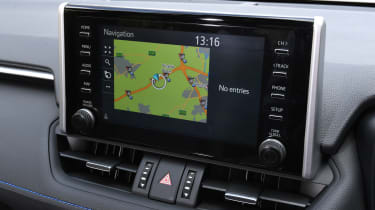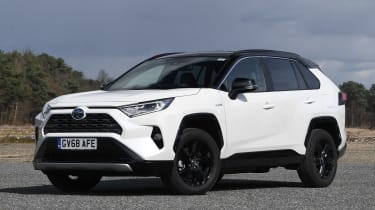New Toyota RAV4 2019 UK review
The new Toyota RAV4 is pricier than its rivals, but is it worth the premium? We drive the new hybrid SUV in the UK to find out

The RAV4 might seem pricey compared with some alternatives, but there’s still plenty to recommend here. It’s spacious, refined and well built, and while some rivals offer sharper handling, the Toyota counters with great comfort. It’s just a shame that the infotainment system is still well behind the best in class, and that the engine drones so noisily. Fuel bills promise to be very cheap, though – especially if you spend plenty of time driving in town.
This is the new Toyota RAV4. Prices for the fifth generation of arguably the founder of the crossover class start from £29,635 and climb to £36,640. On the face of things, these numbers place it in a risky no man’s land in the current market.
That’s because cars such as the Peugeot 3008, Skoda Karoq and Ford Kuga can all be considered rivals to the RAV4, but their ranges start in the low twenties. And models from the perceived ‘posher’ brands aren’t much more expensive than the top-spec Toyota: the cheapest Volvo XC60 costs £38,470. So what justifies a price which, on paper at least, looks rather steep?
• Best small SUVs and crossovers
Under the skin, the RAV4 rides on the TNGA platform that forms the basis of many recent Toyotas: the Prius, Corolla and C-HR all use it. This allows the use of both traditional combustion-engined layouts and a petrol-electric hybrid system. While some markets get both versions, UK-spec RAV4s will only be offered with the electrified options.
There’s a choice of two models: front and four-wheel drive, each with a 2.5-litre petrol engine linked to a front-mounted electric motor. The difference between them comes at the back: an extra £2,240 buys a second electric motor to drive the rear wheels.
Used - available now

2024 BMW
M3
29,000 milesAutomaticPetrol3.0L
Cash £49,850
2025 BMW
iX
81,249 milesAutomaticElectric
Cash £26,272
2022 BMW
i3
33,096 milesAutomaticElectric
Cash £14,032
2025 Toyota
Yaris Hybrid
26,859 milesAutomaticPetrol1.5L
Cash £14,935The total system output stands at 215bhp for the front-driven model and 219bhp for the four-wheel-drive cars, enough for 0-62mph times of 8.4 and 8.1 seconds respectively. On paper, both of those figures better the family SUV average. And from behind the wheel, they feel much quicker: the instant torque of the electric motor makes our front-wheel-drive test car lively away from the line, and the power builds from there in one smooth, linear shove.
It’s just a shame that, as with many previous hybrid Toyotas, the noise is so unpleasant. The engine is hooked up to a CVT gearbox which causes a monotone drone from the engine when it’s either cold or under load. This is a pity because when its Lexus UX cousin – a TNGA-based hybrid with a different 2.0-litre petrol-electric drivetrain – sounds so refined, it clearly isn’t beyond Toyota’s scope to make this set-up work.
Much more convincing is the comfort-based approach to the RAV4 driving experience. The ride cushions its occupants well from the road below, suppressing the sound of shocks and bumps impressively. Despite this, the body remains under control, never wallowing in the way a Honda CR-V might. With the engine settling down at a cruise, the most audible sound at motorway speed is the rumble from the tyres. The RAV4 is simple to drive, too: the precise steering makes it easy to place on the road, and it’s light at parking speeds.
You can make up your own mind about the exterior styling, but at least it could never be mistaken for a Skoda Karoq or a VW Tiguan. The inside is hard to fault, though: build quality is faultless, and the chunky temperature switches and gently glowing cubbies are lovely touches. The rubberised door grips feel nice, too, although one wonders how long it’ll be before they get grubby.
If there’s one true letdown, it’s the infotainment system. Pick any rival set-up you like – whether from Kia, VW or Ford – they all offer slicker interfaces with sharper graphics. The complete lack of Apple CarPlay or Android Auto compatibility seems bizarre, since both make for an ideal ‘get out of jail free’ card for any sub-standard system. At least the Toyota’s menus aren't too difficult to work out, and the physical shortcut buttons are welcome.
The basic Icon trim doesn't get satellite navigation, but elsewhere, equipment levels are great. We’d go for the Design: it comes with standard front and rear parking sensors, sat-nav, 18-inch alloy wheels and LED headlights.
The RAV4 is slightly longer and taller than a Ford Kuga, and those dimensions translate to generous interior space. Rear leg and headroom are impressive overall, but if you are tall you might find it wanting for under-thigh support: the floor feels high in relation to the seat squab, forcing taller occupants’ legs up at a steep angle. The 580-litre boot isn’t quite as roomy as that of the Peugeot 3008 (591 litres) or the Volkswagen Tiguan (615 litres), but it’s more than big enough.
So the RAV4 drives as well as its rivals, it offers stronger performance and it has one of the smartest cabins in its class. That price is beginning to look more reasonable, then, but its greatest appeal lies in its fuel consumption. On our test routes, covering a mixture of city and motorway driving, the new Toyota returned figures as high as 61mpg, and never below the mid-forties. Those numbers are roughly similar to what you can expect from a Kia Niro Hybrid – a crossover which is both smaller and significantly slower than the RAV4.
It scores well for emissions, too. NEDC-corrected CO2 emissions of 105g/km – or 102g/km on the smaller 17-inch wheels – mean that the RAV4 falls into significantly lower Benefit-in-Kind (BiK) tax groups than pretty much any of its rivals, at least until the plug-in hybrid version of the Peugeot 3008 arrives.
So it’s sure to appeal to company car users, but how does it fare on a Personal Contract Purchase (PCP)? The closest alternative to the Toyota RAV4 in price and philosophy is the Honda CR-V hybrid, another petrol-electric SUV which scores strongly for comfort. Here, the Toyota stacks up very well: taking a 2WD RAV4 Design and a CR-V SE as an example, and with a matching deposit (roughly £8,600, in this case), the Toyota costs £56 per month less, at £233 versus £289.

